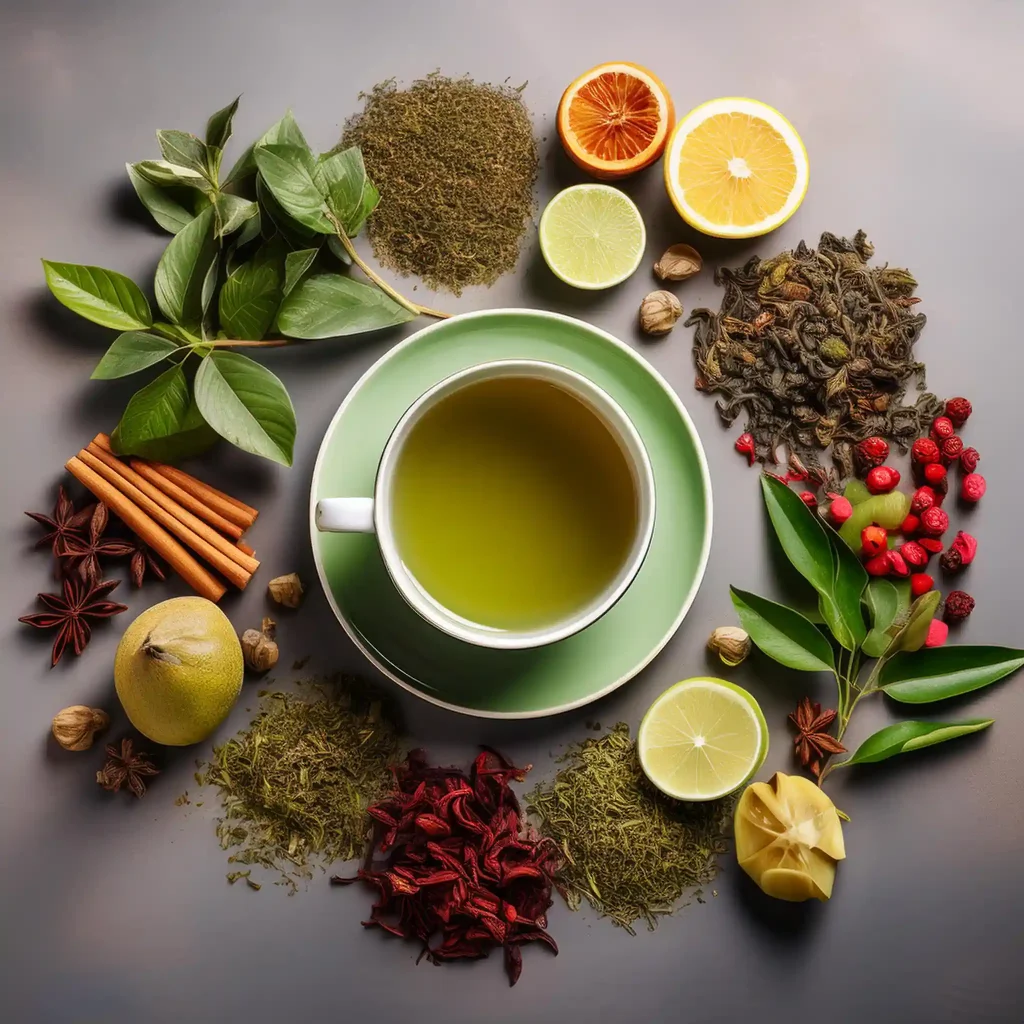Tea, in all its forms—green, black, white, herbal—has been heralded as a health elixir for centuries. It is often marketed as a cure-all, a simple, natural solution to weight loss, detoxification, longevity, and mental clarity. However, the common perception of tea as a miracle beverage might be somewhat inflated. While tea undoubtedly has some health benefits, the claim that it is a panacea for various ailments is overblown. Speaking from both personal experience and scientific research, I’ve come to realize that tea’s reputation for extraordinary health benefits might be more marketing than medicine.
The Beginnings of My Tea Journey
Like many others, I was swept up by the allure of tea’s supposed health benefits. Green tea, in particular, was always at the forefront of these discussions. I vividly remember standing in the tea aisle of a local store, surrounded by an array of beautifully packaged tea boxes, each boasting miraculous benefits. The more I read, the more I believed: “Drink this tea, and you’ll lose weight!” or “Your body will be detoxified by this blend!” It seemed like the best way to maintain a healthy lifestyle was to drink tea.
I started incorporating different types of tea into my daily routine. I drank green tea first thing in the morning for its antioxidant properties, sipped on herbal teas during the afternoon to stay calm, and even indulged in chamomile at night to aid sleep. I felt virtuous and healthy, like I was making a positive change in my life simply by switching from coffee to tea.
But over time, the effects that were promised didn’t exactly materialize. I wasn’t shedding weight as effortlessly as I had hoped, and my energy levels remained the same. While tea certainly provided a pleasant break and helped me feel relaxed, I began questioning whether the hype around tea’s health benefits was real or just exaggerated.
What Science Says About Tea’s Health Benefits
Tea has been studied extensively, and there is no denying that it contains compounds that are beneficial to health. For instance, green tea is rich in catechins, particularly epigallocatechin gallate (EGCG), which has been linked to improved brain function, fat burning, and cancer prevention. Black tea, on the other hand, contains theaflavins, which have been associated with better heart health and reduced cholesterol levels.
But here’s the catch: the positive effects seen in studies are often the result of concentrated doses of these compounds, not what you typically get from a single cup of tea. In many studies, the benefits were observed in people consuming much higher quantities of catechins or other compounds than what is found in a typical serving of tea.
For example, many studies that link green tea consumption to weight loss or improved metabolic function involve drinking upwards of 4-5 cups a day, sometimes even more. Even then, the weight loss results tend to be modest. Additionally, some studies use green tea extracts or supplements, which are far more concentrated than the brewed tea most of us consume. The same goes for the polyphenols in black tea, which are often studied in their pure or concentrated forms rather than the diluted state found in everyday tea consumption.
From a scientific perspective, while tea can contribute to a healthy lifestyle, it should not be considered a replacement for other, more proven strategies, such as a balanced diet and regular exercise.
My Personal Health Journey with Tea
After months of drinking multiple cups of tea a day, I noticed little change in my overall health. Sure, I enjoyed the ritual of brewing and sipping tea, and it did offer a comforting, caffeine-rich alternative to coffee. But I didn’t experience the weight loss, energy boost, or mental clarity I had anticipated.
I started doing more research and found out that while tea does have antioxidants, these benefits are often overstated. The idea that tea alone could lead to drastic health improvements was, in many ways, a product of marketing more than medicine. The antioxidant content of tea, while beneficial, is also present in many other foods, such as fruits and vegetables, without the need for excessive caffeine intake. I realized that I had been focusing too much on tea as a quick-fix solution for health issues that required more substantial lifestyle changes.
For example, while I had hoped that green tea would help with weight loss, it was clear that exercise and a proper diet played a much larger role. The tea was just a small part of the equation. Similarly, I had been relying on tea to boost my energy levels, but a consistent sleep schedule and stress management were far more effective.
Why Tea Isn’t the Miracle Beverage It’s Made Out to Be
One of the reasons tea is often overrated is that it’s positioned as a natural remedy, and people have a tendency to assume that anything “natural” must be good for you. But natural doesn’t always mean effective. While tea can be a healthy addition to your diet, it’s not going to solve all your health problems.
1. Weight Loss Myths
Tea, particularly green tea, is often marketed as a weight loss aid. While it’s true that green tea can slightly boost your metabolism due to its caffeine and catechins, the effect is usually small. Studies have shown that any weight loss directly attributable to tea consumption is modest at best, especially when it isn’t paired with other lifestyle changes such as regular exercise and a reduced-calorie diet.
For someone like me, who was hoping for a more dramatic transformation, this realization was a bit of a letdown. I had bought into the idea that sipping on tea throughout the day would somehow melt away the pounds. The reality, however, was that tea alone was not going to do the heavy lifting.
2. Detoxification Claims
Tea, particularly herbal varieties like dandelion and detox teas, is often sold with the promise of “detoxifying” the body. This is one of the most misleading claims about tea. Our bodies already have highly efficient detox systems—our liver and kidneys are working hard every day to process and eliminate toxins. Drinking tea doesn’t suddenly enhance their ability to do so. While certain teas might have diuretic effects, which make you urinate more frequently, this isn’t the same as “detoxifying” the body.
I briefly fell into the detox tea trend, thinking that it would somehow cleanse my system after indulging in junk food or alcohol. In reality, the only noticeable effect was the frequent need to visit the bathroom, which isn’t the kind of cleansing I had in mind. Over time, I realized that the best way to “detox” is to simply eat healthily and drink plenty of water—tea doesn’t add much to the equation.
3. Energy and Mental Clarity
There’s a persistent belief that tea, particularly green and black varieties, can improve cognitive function and mental clarity. While it’s true that tea contains caffeine and L-theanine, which can have positive effects on alertness and focus, it’s not a miracle brain booster.
I often found myself drinking tea during long workdays, hoping it would help me concentrate better. While the caffeine gave me a slight boost, it wasn’t any more effective than coffee or even a good night’s sleep. The truth is, tea can offer temporary relief from fatigue, but it’s not going to turn you into a mental powerhouse.
4. Heart Health Benefits
There’s evidence that drinking tea, particularly black and green varieties, can improve heart health by lowering blood pressure and cholesterol levels. This is one area where tea does show promise, but it’s important to keep the benefits in perspective.
For instance, the improvements in heart health seen in tea drinkers are often modest and typically occur when tea is consumed as part of a broader healthy lifestyle. It’s not as simple as drinking a cup of black tea each morning and expecting to stave off heart disease. Factors such as diet, exercise, and genetics play a much larger role in heart health than a single beverage.
How Tea Can Fit into a Balanced Lifestyle
Even though tea might not live up to the lofty health claims, that doesn’t mean it should be completely dismissed. Tea can be a healthy, enjoyable part of your daily routine—as long as it’s not relied upon as a miracle cure. Here are some ways you can incorporate tea into a balanced lifestyle:
1. Enjoy the Ritual
One of the best things about tea is the calming, meditative ritual that comes with it. The process of brewing and drinking tea can be a relaxing break from the busyness of everyday life. In a world where we are constantly rushing from one task to the next, tea can offer a moment of stillness and mindfulness. In this sense, tea is less about its chemical components and more about the experience it provides.
2. Pair Tea with Other Healthy Habits
Instead of relying on tea to singlehandedly boost your health, use it as a complement to other healthy habits. For example, drink green tea after a balanced meal or sip on herbal tea after a yoga session. When combined with a healthy diet, exercise, and stress management techniques, tea can enhance your overall sense of well-being.
3. Moderation is Key
Drinking tea in moderation is essential. While tea has some health benefits, too much caffeine can cause anxiety, disrupt sleep, and lead to dependence. Herbal teas, while caffeine-free, can still have strong effects on the body, especially if consumed in excess. Keep your tea consumption in balance with other beverages, such as water, and don’t overdo it in the hopes of reaping more benefits.
4. Choose Quality Over Quantity
When it comes to tea, quality matters. Rather than drinking large amounts of cheap, processed teas, invest in high-quality loose-leaf varieties that are packed with flavor and nutrients. Compared to mass-produced tea bags, organic, whole-leaf teas typically retain more of its health-promoting ingredients.
Tea is Not a Miracle Cure
While tea has some health benefits, the belief that it’s a miracle cure for a wide range of ailments is largely overstated. My personal experience with tea taught me that, while it can be a delightful and relaxing part of my routine, it’s not the answer to weight loss, detoxification, or enhanced mental clarity. The key is to approach tea with a sense of balance and realism, rather than expecting it to perform miracles.
For those who enjoy tea, keep drinking it—but remember that true health comes from a combination of good habits, not from any single food or beverage. Enjoy your cup of tea for what it is: a simple, soothing drink that can complement a healthy lifestyle, but not replace the fundamentals of good health.

